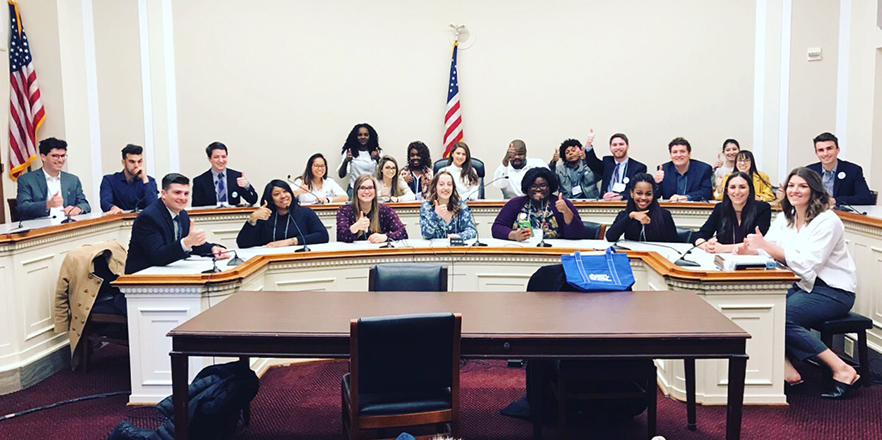Lia Beatty '21 Finds Her Voice and a National Spotlight in Advocacy Work
By India Flinchum '21

When Lia Beatty '21 joined the Eye to Eye chapter at Whitman College and became involved in advocacy for students with learning disabilities, she had no idea that work would catapult her into a national spotlight.
But that's just what happened this spring to the neuroscience major from South Bend, Indiana. When news broke about a college admission scandal where celebrity parents allegedly used fake learning disabilities to help their students cheat on exams, major news outlets began looking for college students who could speak to the scandal.
Beatty has been advocating for students with learning disabilities at Whitman and beyond since learning she had learning disabilities as a first-year student. In February, she traveled to Washington, D.C., with Eye to Eye and the National Center for Learning Disabilities to lobby for the RISE Act, which increases college access to students with disabilities by providing education on disability services at universities to ease the transition to higher education.
In D.C., Beatty attended lectures and presentations by politicians and disability advocates, including Michael Yudin, the education advisor to Obama; and New Jersey Sen. Cory Booker.
 Beatty said the highlight of her experience was meeting independently with 5th Congressional District Rep. Cathy McMorris Rodgers, R-Wash. McMorris Rodgers showed promising support for The RISE Act.
Beatty said the highlight of her experience was meeting independently with 5th Congressional District Rep. Cathy McMorris Rodgers, R-Wash. McMorris Rodgers showed promising support for The RISE Act.
The Seattle Times, ABC News, the ABC podcast Start Here and The Chronicle for Higher Education interviewed Beatty to get her take on the admissions cheating scandal.
"Unfortunately, the pervasive understanding of accommodations is that they're this disingenuous allegiance between you and the teacher or professor - like getting the easy way out. They really just level the playing field," Beatty said.
Beatty became interested in advocacy work as a first-year student at Whitman when she was diagnosed with dyslexia, ADD and a processing disorder. She learned about Eye to Eye during a Power and Privilege Symposium panel about facilitating conversations about learning and attention issues.
The chapter, which is part of a national organization, pairs Whitman students with learning disabilities with fourth- and fifth-graders from Walla Walla public schools. The groups and meet weekly to do art projects. The collaboration builds self-advocacy and confidence in the elementary students.
Beatty is majoring in neuroscience, an individually planned major, and hopes to pursue disability advocacy in the future from a research-based approach, in which she hopes to positively inform disability policy.
"In order for me to feel like I had a stake in my education, I had to pick a trajectory that I knew was going to be impactful," she said. "I think neuroscience is a healthy combination of psychology, biology and just having a humanistic approach. It's definitely rooted in wanting to do more disability advocacy from a science perspective."
In addition to her advocacy work, Beatty is passionate about the outdoors. She is a trip leader and special projects intern for the Outdoor Program and works in the Rental Shop. She leads canoeing, hiking, and stand-up paddle boarding trips.
Beatty hopes to continue disability advocacy during her time at Whitman through Eye to Eye and also in the future through a career in which she hopes to influence disability policy through science research. Her passion, which guides her disability advocacy, is driven by the justice and equality she seeks for people with learning disabilities.
"Ultimately, learning disabilities can be distilled down to a problem in information processing. I like to think of accommodations as helping with processing. We have the information in our brains, and we can work with it, but it's the reception and the production that's challenged," she said. "Accommodations do not provide us with novel information or make the information any better. They simply help us with the processing of the information."